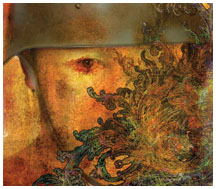
|
March 19, 2008: Perspective
(Michael Woloschinow) |
Warriors
and poets
Reading great books, at West Point and Princeton
By Evan Thomas
Evan Thomas, editor at large at Newsweek, is in the first year of a five-year campus appointment as the inaugural Ferris Visiting Professor of Journalism in Residence. This article first appeared on Newsweek.com as a Web exclusive on Dec. 28, 2007.
From my mother’s sleep I fell into the State, / And I hunched in its belly till my wet fur froze. / Six miles from the earth, loosed from its dream of life, / I woke to black flak and the nightmare fighters. / When I died they washed me out of the turret with a hose.
At the U.S. Military Academy at West Point, an English teacher named Elizabeth Samet teaches this poem, Randall Jarrell’s “The Death of the Ball Turret Gunner,” to plebes, first-year students. It is about the death of a gunner on a B-17 bomber over Germany in World War II, but it might as well be about the death of a turret gunner on a Humvee rolling over an IED — an improvised explosive device — in Iraq. In Samet’s class, the cadets, who assume they will be sent to Iraq when they are commissioned as second lieutenants, also read glorifications of war, like Malory’s Le Morte D’Arthur, as well as depictions of war’s darker side, like Tim O’Brien’s The Things They Carried (“a true war story is never moral”). When Samet’s students graduate and go off to war, Samet stays in touch with some of them, mailing them boxes of her favorite books. At first she thought it might be a mistake to send them books with war themes — perhaps what they really wanted was a diversion from war — but then she decided that it would be disingenuous to send them anything else. So off go the boxes filled with Joseph Heller and Homer.
It’s hard for any good teacher of English to get away from war; great literature is soaked in it. Along with love, war supplies us with the greatest human drama. And war, like love, seems to somehow be essential to the human condition. “You may not be interested in war,” Leon Trotsky once wrote, “but war is certainly interested in you.” For Samet, teaching these young cadets, the trick is to reconcile romantic notions of honor and glory with harsher realities, the randomness of death by IED or the savagery of bombing civilians — all the great and terrible things that humans do when fighting for their lives against other humans. In her new book, Soldier’s Heart, she does it beautifully. The book, named after an archaic term for combat fatigue or, to use the modern acronym, PTSD, is a recollection of her 10 years of teaching English at West Point, but it is much more than that: a meditation on the need for both myth and reality in preparing young officers for war.
West Point, to its students and even to the idle tourist, seems like a sacred place. The ghosts of dead warriors lurk in the gray battlements and rise from river mists below the Plain where the cadets march like toy soldiers on Saturday mornings. Interestingly, though perhaps not surprisingly, the cadets do not celebrate solid models of probity like Washington, Eisenhower, and Bradley, though these generals are respected. Rather, Samet writes, “all love goes to the arrogantly defiant MacArthur, the renegade Patton, and above all the man the historian Bruce Catton calls the ‘courtly Lee.’” This does not mean that the cadets romanticize war — indeed, the military academy does its best to leaven myth with cautionary tales from My Lai and Abu Ghraib. But some hero-worshipping is necessary to make young men and women, who could be off living sybaritic lives in college, suffer through four years of exacting and exhausting discipline for the privilege of dying for their country. All warriors wish for the poet: Alexander lamented that he had no Homer.
At West Point, cadets are required to take English 102, a literature course. In Samet’s classroom, they use literature to investigate truth and beauty, right and wrong. There is something unapologetic and urgent about their quest for meaning. To command 30 troops in a war zone, young officers need human values as well as military tactics. I could not help thinking of the students at Princeton, where I teach a writing course. They can find humanistic values in their courses, if they go looking for them. But at elite schools like Princeton, academe has been so constricted and warped by political correctness and specialization that students are more typically left wrestling with jargon and abstractions like “agency” or dully pondering the evils wrought by “patriarchal hegemony.” No wonder the students are so often pre-professionals heading straight for Wall Street. They are stoical and toughened by competition, but something of the traditional liberal arts education, I fear, has been lost. Ironically, while Princeton has become in some ways more like Sparta than Athens, Athens lives at West Point, at least in Professor Samet’s classroom.
Samet is herself a product of Harvard College and Yale’s graduate
school. At those institutions, she writes, she adopted the usual protective
veneer of doubt and suspicion. But after a decade teaching at West Point,
she is a cynic no more. When she decided to take a teaching job at West
Point, an acquaintance at Yale patronizingly told her, “You’ll
humanize them.” The cadets and the instructors “had seemed
pretty human to me,” she writes. “In fact, they may have done
a little in the years since to humanize me.” ![]()
From Newsweek, Dec. 28, 2007, Newsweek Inc. All rights reserved. Used by permission and protected by the copyright laws of the United States. The printing, copying, redistribution, or retransmission of this material without express written permission is prohibited.

